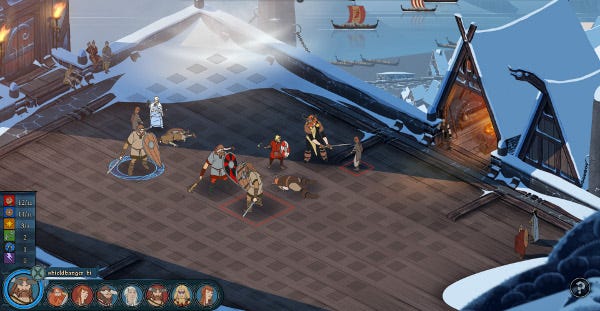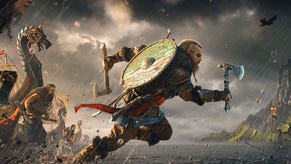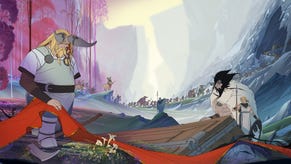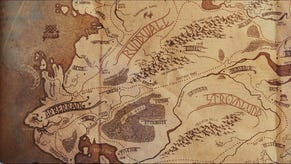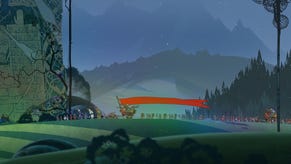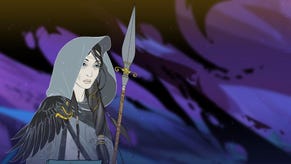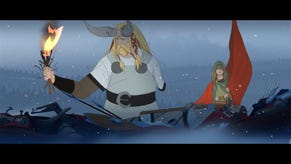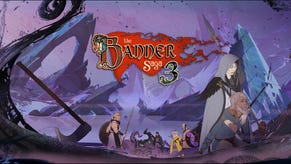Of Banners, Sagas, Microtransactions, And Balance
The Banner Saga Blowout, Pt 2
Last week, you (probably, I hope; otherwise we can't be friends anymore) read my impressions of The Banner Saga: Factions, the soon-to-be-released F2P multiplayer spin-off of Stoic's gorgeously animated Viking strategy epic. Those are some of my favorite adjectives stacked together into a scrumptious sentence sandwich, so I came away predictably pleased. But after finishing my session and quaffing a hearty Viking ale grilled cheese from a towering flagon paper plate, I had questions. For instance, how do microtransactions work? How will multiplayer tie into the multi-part single-player storyline? How will Stoic balance all of that? What's the deal with, er, the banners? Then we huddled around a centuries-old storytelling flame desk lamp, and Stoic told me a tale for the ages.
Balance
RPS: So Banner Saga: Factions is set to release before Banner Saga proper and herald its arrival, but what happens after that? Is this just a quick promo, or are you in it for the long haul?
Arnie Jorgensen: Even after chapters one, two, and three of the Banner Saga are done, we hope to continue supporting it. Players are going to have tons of content that we keep back-filling from the single-player that hopefully will keep this thing going.
RPS: What sort of content? What kind of things are you going to add from the single-player to Factions?
Alex Thomas: The main thing is, we're going to have a lot of specific classes for the story. As those come online, we're adding multiplayer versions of those. We're going to be adding different gameplay modes, like skirmish, playing against the computer. As we develop the AI for the single-player game, then we can add an AI version to the multiplayer. It really is like every time we add a feature, we want to see if we can leverage that in Factions.
RPS: And I assume you're trying to keep those different - but not better or worse, so it all stays neatly balanced?
Alex Thomas: We're very aware that we don't have a big team to constantly be rebalancing. Doing the hardcore balance playtesting. Part of it comes down to... Similar to Magic: The Gathering, when you're building a deck, you may make a crap deck, or you may make a very specific gimmick deck, or you may make a well-balanced deck. It's up to you to make the deck that you like to play with and tweak and fine-tune. We're doing something very similar here, because you don't have just one character. Most hands will have six characters. Some may be better in combination with others. You might put together a team that sucks and you'll retry it completely. We're hoping that, balance aside, as long as we keep in mind that some classes have certain roles in combat, and you need to have a little bit of everything, it's up to the player to make their team work.
Arnie Jorgensen: The idea here is that we've got lots of different classes. You can only play six at one time. We'll be launching with 12 to 16 classes, so you have to choose. Which six do I want to roll into combat with? That's where we're hoping people come up with crazy permutations... If you like the Siege Archer, you can do six of her on your team. There might be some that are freakin' nasty that way. I'm hoping.
Brian Mumm: Six Thrashers? That's my dream team.
Alex Thomas: We're probably going to have permutations come up that we didn't consider or that are just uber, and that we'll have to [correct for that].
RPS: In a game with this many possible permutations that - at least, on paper - sounds like it'll be constantly evolving, how do you go about doing that, exactly?
Arnie Jorgensen: There's two different ways, I think, that games balance. One way is that they make everybody so exactly equal that the game's balance becomes static. It's not fun. It doesn't matter what class I take, it's the same game. It becomes boring to me really quickly.
The chancier thing is to let it be a little more dynamic, or a lot more dynamic, and let players find something we never thought of. Then we have to balance against that. Just like StarCraft does. That, to me, is way more fun, because the game has a lot more flux in it. Really, if a game is fun, a game is fun. The last thing I want to do is design a game that's so balanced that it's static. So in order to do this, we're making classes wildly different from each other. You have giants that have massive strength and massive armor. Then you have humans that have less strength, but hopefully they'll come together well. So far, the classes that we're going to be launching with initially, we haven't had any games where we don't have classes that are viable. That's the important thing to me. We haven't found a team that can just beat every team yet. That's perfect. And when people do, that'll be when we have to rebalance it.
Brian Mumm: Another thing, too, is to get a lot of variety in our battles. We've been playing with a lot of the same roll-outs, but the battles can turn out drastically different. The way the battle shifts, too. Sometimes you can feel like, "Oh my gosh, there's no way I'm going to win this game." Then you pull out a move that shifts the battle in your favor again. I haven't had too many matches yet where it's just a complete slaughter.
Alex Thomas: It's amazing how dynamic it is now. Arnie and I play each other, and it's never the same.
John Watson: We're playing the same exact classes, the same exact order, multiple times and getting very different results that can turn the tide halfway through. So far, the system itself seems to be really dynamic and interesting. Any game with a strategic element that goes on for a long time, people figure out the optimal way, but I think learning what that is along the way is a large part of the fun for the players. It'll take years before people can say, "Okay, this is the best possible thing versus that." Same with Magic: The Gathering. High-level players will see a deck and say, "Okay, I can't beat that deck." But every time they release a new pack, there's the fun of learning what that new strategy is going to be.
Alex Thomas: Basically, each class has a cap. What we wanted to do is, we don't want the player to be able to max out all of their stats. So you could have two Warhawks, for example, who are built very differently and serve different roles in combat. When you hit your stat cap, you get the option to promote. Promotion will reset your stats. It gives you another level in your ability and adds one to the stat cap. You can promote your characters multiple times, and you have to build them back up
Arnie Jorgensen: We could have two Wardogs. Let's say Wardogs can get 18 strength. They're the strongest giant in the game so far. And we'll have built our Wardogs completely differently. He'll have 18 strength and I'll have 12, because I put it all into willpower and exertion and other things. And they're both equally viable. But the cool thing, as we said, is that two rank threes in the same class are going to have unique builds depending on how you want to play them.
Microtransactions
RPS: How exactly does all of that work in practice with the semi-persistent nature of Factions? Do you have a consistent team of characters that's leveling up, and as you level you move into different brackets?
Arnie Jorgensen: It's very similar to that. Factions is different than the Saga. In the Saga you'll be playing characters we give you, with actual names. People from our story. In Factions, you're going to be taking characters, naming them, leveling them up from one through five as far as rank.
Alex Thomas: Like you saw before, [the city, Strand] is your hub, where you can go everywhere in the city. Every time you play a match, for every kill that you make, whether you win or lose, you get some Renown. Renown is the overall currency that you do everything with. You use Renown to buy new characters and to buy custom banners. When you buy new characters, they go in your overall party. You'll be able to have as many characters as you want. Like they're talking about before, we want you to build a huge collection of characters - like action figures, that kind of thing.
RPS: Factions is free-to-play, though. So where do the microtransactions enter the picture? How do they tie into Renown, class balance, and whatnot?
Alex Thomas: We're trying to keep it as simple and un-harassing- I know that's not a word - as possible.
Arnie Jorgensen: Unobtrusive? That's a word.
RPS: Unobtrassive, got it.
Alex Thomas: Basically, your Renown is your currency for everything. Like we were saying, every time you get a kill, you get one Renown. You can buy Renown if you want to speed up your progress, and that's it. You're basically deciding, "Well, I could play a bunch of matches," or "I'm really interested in this character so I'm just going to get some Renown and pick him up and play with him."
Within each character, and this is using the same pool of Renown... You'll play a match. You'll get an idea like, "I really wish that guy had higher armor." You can come back here, use the Renown that you just earned - one for each kill that you got - and upgrade your character. Or you can buy it.
Arnie Jorgensen: There's a couple of reasons for that. One was the whole... "We're playing D&D, we want you to play with us this weekend. If somebody hasn't been playing for a while, we'll roll you up a higher character."
The other reason is, since we're multiplayer-only when we ship, we need full servers of people at your level. If you're a level 60 power-group team, we need lots of people in that server, or you're going to be looking for matches and not finding any. So as far as we're concerned, the more full servers, the better. That comes back, also, to the achievements. Somebody says, "Well, I work all day, but I really like these games. I want to try the high-level characters." They can purchase them and throw down. But they'll be matching up with people where they'll see, "Oh, he's got one achievement, so he probably isn't..."
John Watson: He's got a badass deck, but he doesn't know how to play it.
Arnie Jorgensen: The achievements are a good way to say, "Yeah, I've been playing this game hardcore." We're balancing all the awarding of the Renown so it can easily be played without purchasing everything.
Alex Thomas: Right. We want to go out of our way not to make it a pay-to-win game. That's always tricky when you have to make revenue somehow. The bottom line is, you can do everything just by playing the game. If you want to speed it up a bit, you can purchase Renown.
RPS: And because whenever you make a team, it measures your total team power level - which basically measures all of your characters' stats - so it'll still match you with people who have equal stats, right?
Arnie Jorgensen: In this, you're the same power level. Your opponent's not ahead of you. You're matching up against a guy like you. It just gives you somebody else to play.
Why Single-Player And Multiplayer Are Inseparable
RPS: What sorts of characters and items will we see trickle in from the single-player story? Also, how will that affect the balance? What happens to free players when owners of The Banner Saga proper start charging in with crazy story classes?
Arnie Jorgensen: Everything in our game revolves around this big story-based idea that we've got. The whole game started with this story. Factions takes place on the map, in the story-based world. These aren't two different worlds. As things happen in this world, things happening in your story, they're going to happen to Strand and the other areas on that map. Not to go into it too much, but Strand is going to be an evolving city as you play. Easily updatable and changeable.
Alex Thomas: That was a big theme I think we glossed over a bit. When Chapter One comes out, what happens in Chapter One is going to have a direct relation to what happens in Factions. As you unlock characters in Chapter One, you'll unlock them in Factions as well. We want free players to see [story classes in action]. We're calling our magic-users Menders. They get hooked up in a match where they're fighting against Menders casting these spells, and they're like, "Holy crap, how do I get that?" You get the single-player game and you play through it, and now you know who these characters are and you can use them.
Arnie Jorgensen: Since Factions is a free-to-play game, we are hoping to pull people along into the single-player story-based game. If you only want to play Factions, you don't have to pay anything. It's a free game. But eventually, when you're playing against the story-based people, you're going to be fighting against guys who have Centaurs and Menders and crazy crap like that. You're going to go, "Okay, I think it's time."
John Watson: "I want one of those!"
Alex Thomas: Again, it's not like the Menders are going to ruin you and kick your ass. It's just that you've never seen that guy before, and he's awesome.
Arnie Jorgensen: It gives the other players, though, far more options. One more thing you can have in your mix.
I think we're going to have to be tweaking the whole way along. Just like DOTA. DOTA's got, what, more than 80-something units to play? It's very hard to balance, but you know what? Some of those units suck. Some are awesome. But we have six per side. Even if you have one that generally doesn't work well, with a particular six, it might be awesome. We're hoping that the six really helps to balance itself out.
But the whole time, I think we're going to be continually updating and balancing units and teams. If we ever do run across a team that's the flavor of the moment and nobody can get beat using this team, then we're definitely going to be balancing that. But we want people to have fun with it for a while. And I'll tell you, if I can make a team that could beat that, we might just leave it and let people rebalance the game themselves.
John Watson: The great thing about an online game where we host from a central server, the server can just record everything that happens. We can see things that are aberrations. People with two Archers in their party winning every time. Nobody ever plays this class, I wonder why? Let's figure out how we can make it better.
Banners! Sagas! Thes!
RPS: So, multiplayer seems like it could contain some pretty saga-y moments. But what about banners?
Alex Thomas: When you go to the weaver's hut, we're going to have all of these [guild crests] available, and you'll build your flag. It's a very basic Diablo III sort of thing. You pick the flag background. You pick the crest that you want to represent you. Every time you match up with someone in versus, you'll see you on the top, them on the bottom. You'll see the crest that they chose on the flag.
The interesting part is, as you get achievements, you'll be able to sew them onto your banner. When you match up with somebody, you can see that they've decided to sew in these particular things that they're proud of, or point out that they're a badass. My thing has always been... I understand the appeal of achievements. Personally I don't care at all. They don't compel me, because they're just this personal thing. Nobody looks at your achievements. You just feel good when you see "achievement unlocked."
But I was thinking, "What would make it compelling for me, someone who doesn't care about achievements too much?" And it would be this ability to show somebody what you've done. It has the same feeling in Call of Duty when you pick which little unlockable you've earned every time you kill somebody.
Arnie Jorgensen: Beyond that, also, usually when you go into multiplayer, you're not entirely sure what kind of player you're up against. But if I have two achievements and this guy has 30, I think, "Oh, crap, he's been playing a while." It's a way of showing you, "Hey, just how good is this guy?"
Check back tomorrow for so much information about single-player - both the main story and a "narrative mode" downloadable add-on for Factions - that you'll probably die. (Of entirely natural and hopefully unrelated causes.)
